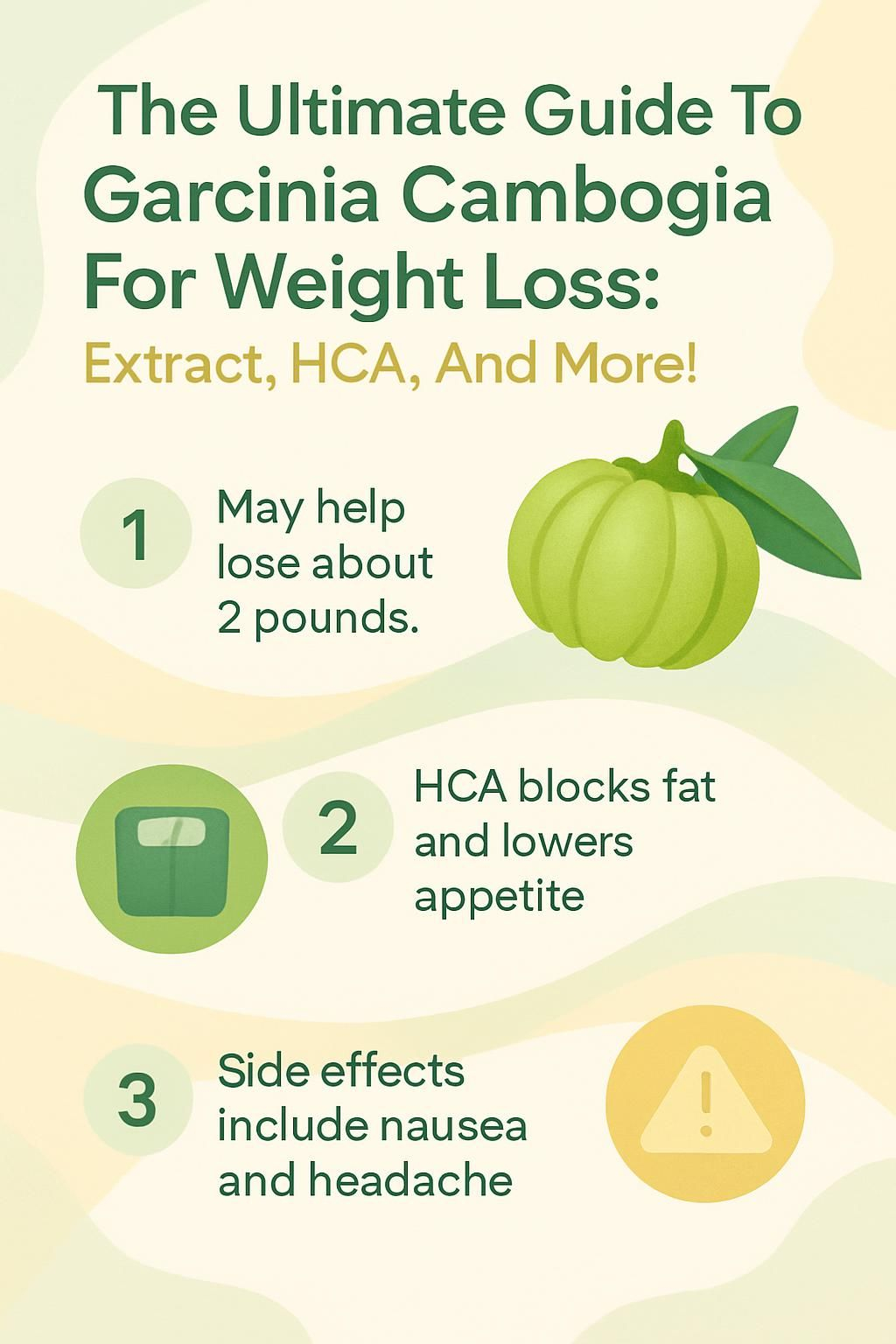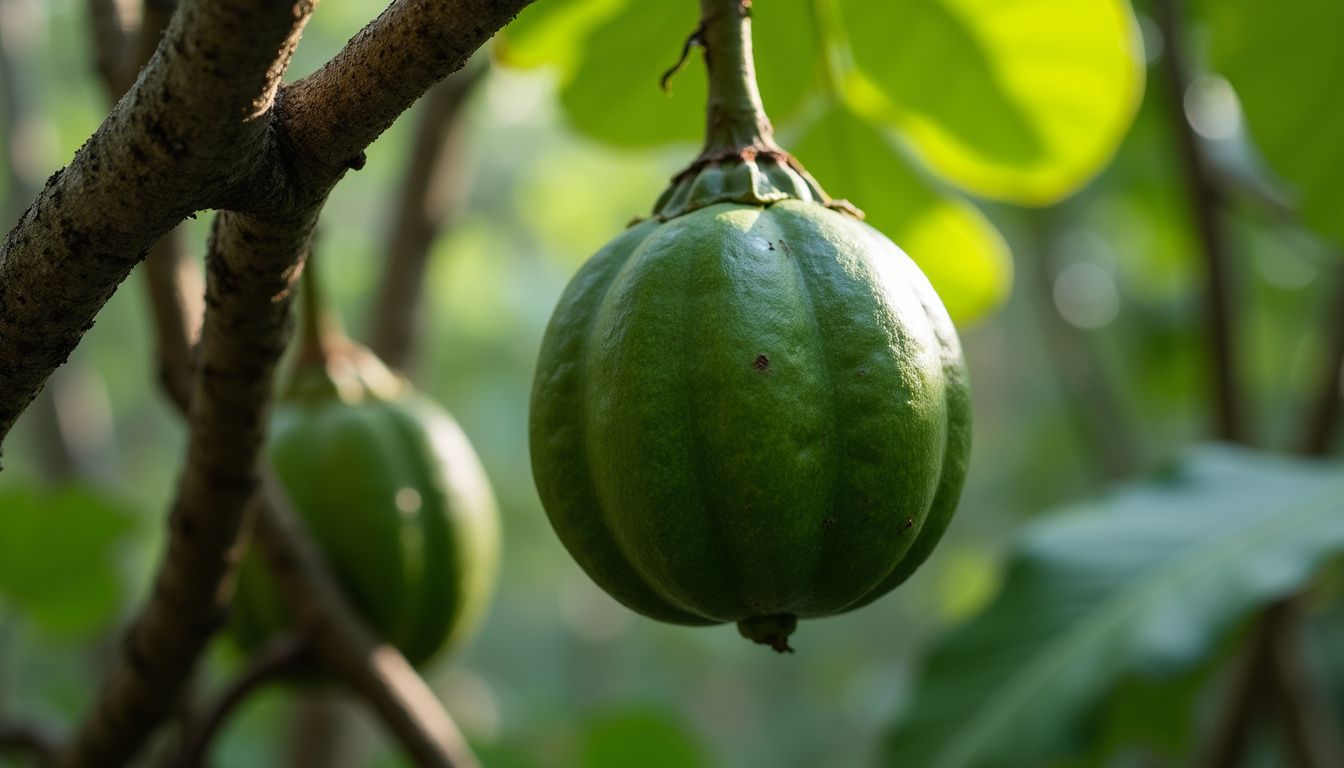The Ultimate Guide To Garcinia Cambogia For Weight Loss: Extract, HCA, And More!
Our Nutrition Assistant AI Suite will transform your body. You will lose fat, get toned, and build muscle. Gain confidence and optimal health.
If you struggle to lose weight, you are not alone. Many people try the dietary supplement garcinia cambogia, made from the rind of a tropical fruit. Early research suggests its main compound, hydroxycitric acid, or HCA, may help block fat and curb appetite. The effect on body weight is small, usually a couple of pounds at most.
This guide explains how garcinia cambogia extract works, what claims are supported, possible side effects, dosage tips, FDA safety concerns, and smart questions to ask your clinician. You will see where the science is strong and where it is weak, so you can decide if it fits your goals.
Key Takeaways
- Garcinia cambogia may lead to about 2 pounds more weight loss than placebo. Reviews like the Journal of Obesity analysis report only modest results.
- HCA may block citrate lyase, the enzyme that helps turn carbs into fat. It may also raise serotonin, a brain chemical that can reduce appetite.
- Common side effects include nausea, headache, and digestive upset. Rare cases of severe liver injury have been reported in medical journals, including Ballotin VR et al., 2021.
- Since 2017, FDA alerts have warned about liver risks and possible drug interactions, especially with SSRIs and other psychiatric medications.
- Choose products with 50 to 60 percent HCA and third-party testing. In the United States, supplements are not regulated for potency or purity by the FDA.

Garcinia Cambogia as a Natural Weight Loss Supplement

Garcinia cambogia, also called Malabar tamarind, grows in South and Southeast Asia. People use it as a weight-loss supplement because its rind contains hydroxycitric acid, HCA, the compound studied for appetite and fat control.
Where Does Garcinia Cambogia Come From?
You can find garcinia cambogia, also known as Malabar tamarind or brindle berry, in tropical forests across India and Southeast Asia. The plant species is Garcinia gummi-gutta, and its fruit rind has been used in cooking and as a preservative for generations.
Traditional medicine in the region uses the fruit for stomach and inflammation concerns. Today, garcinia cambogia extract is sold as a dietary supplement for weight management across the United States and many other countries.
Local communities in South Asia first used Malabar tamarind in food and folk remedies before it appeared on supplement shelves.
What Is Hydroxycitric Acid (HCA) and How Does It Work?
Hydroxycitric acid, or HCA, is the active ingredient in garcinia cambogia’s rind. In lab and human studies, HCA appears to inhibit citrate lyase, the enzyme that helps store fat from extra carbohydrates. Many clinical trials test 900 to 1500 mg of HCA per day.
HCA is also studied for effects on serotonin, a brain messenger that influences appetite and mood. Some research suggests possible benefits for triglycerides, cholesterol, and blood sugar. Results vary, and several reviews funded by public sources, including the National Institutes of Health, call the weight-loss effect modest.
How Garcinia Cambogia Helps with Weight Loss
Think of garcinia cambogia as a nudge, not a shortcut. It may help, but healthy habits still do most of the work.
How Does Garcinia Cambogia Inhibit Fat Production?
HCA in garcinia cambogia extract blocks ATP-citrate lyase. This enzyme helps convert surplus carbs into fat. If you take a garcinia cambogia supplement before meals, HCA may reduce how much new fat your body creates and slightly improve triglycerides and LDL cholesterol in some people.
People often notice better results when they combine the supplement with steady exercise and balanced eating. The effect is small on its own, so pairing it with habits you can sustain matters.
How Does It Help Suppress Appetite?
HCA may raise serotonin levels in the brain, which can reduce hunger and help you feel satisfied after meals. Some users report fewer cravings or less snacking during the day.
Early studies suggest HCA may work better when paired with other herbs such as Gymnema sylvestre, but the evidence is limited and mixed. If you try a blend, review the ingredient list and choose one with clear dosing and safety data.
In What Ways Does It Boost Metabolism?
Some brands claim HCA increases calorie burn and speeds metabolism. Current evidence does not strongly support a major rise in metabolic rate. In randomized controlled trials, average weight loss was about 2 pounds more than placebo across several weeks.
A small change in digestion or appetite is more likely than a dramatic metabolism boost. If you take prescription drugs or have a history of liver issues, talk with a health professional first due to reports of liver toxicity with certain products.
Health Benefits of Garcinia Cambogia
Garcinia cambogia shows potential in several areas, yet results vary and are usually modest. Set expectations low, then track how you respond.
How Does Garcinia Cambogia Support Weight Loss?
HCA may support weight loss by slowing the conversion of carbs into stored fat. A systematic review in the Journal of Obesity found users lost about 2 pounds more than non-users over short periods.
Most trials combined supplementation with calorie control and some exercise. Without lifestyle changes, the effect is likely small. Longer, larger studies are needed to define how much the supplement adds beyond diet and activity.
Can Garcinia Cambogia Help Lower Cholesterol?
Some research reports small drops in triglycerides and LDL cholesterol, with possible increases in HDL, the so-called good cholesterol. These changes tend to be modest and may not appear in everyone.
If you use cholesterol medicine, avoid multi-ingredient weight-loss supplements that include garcinia cambogia. Interactions and rare liver risks are possible, so speak with your clinician before you start.
Does It Aid in Blood Sugar Control?
Limited studies suggest HCA might reduce insulin and blood glucose levels. This could help people who need steadier blood sugar. Yet the same effect can conflict with diabetes medications and raise the risk of low blood sugar.
If you have type 2 diabetes or take insulin or oral drugs, speak with your physician first. Research is still developing, and safety for people with chronic conditions is not fully clear.
Types of Garcinia Cambogia Supplements
Garcinia cambogia supplements come as capsules, tablets, liquid extracts, and gummies. The best form is the one you can take consistently and safely.
What Are the Differences Between Capsules and Tablets?
- Capsules contain powdered extract in a gelatin or plant-based shell. They often break down faster in your stomach.
- Tablets are compressed powder. They can dissolve more slowly and sometimes have a chalky taste.
- Both forms may include binders or preservatives, which matter if you are sensitive to certain ingredients.
- Many people find capsules easier to swallow and less noticeable in taste.
- Potency varies by brand since supplements are not FDA-regulated for strength in the United States.
- Capsules tend to travel well and resist crumbling compared with some tablets.
- Check labels for HCA content per serving. Choose clear, standardized dosing.
- Capsules may have longer shelf life because the shell helps protect the powder from air and light.
- Both forms come in various strengths and sizes, so compare before you buy.
- Look for brands that follow good manufacturing practices to reduce contamination or label errors.
Match the form to your routine, swallowing comfort, and sensitivity to added ingredients.
What Are the Benefits of Liquid Extracts?
Liquid extracts allow flexible dosing, and you can mix them into water or tea. Some brands claim faster absorption, though research does not clearly show better weight-loss outcomes with liquids.
Quality and potency can vary widely. Read labels closely and consult your doctor if you also take pain relievers, a multivitamin, or other medications.
Why Choose Gummies as a Supplement Form?
Gummies are simple and taste pleasant, which helps with daily use. You can take them without water and carry them easily.
They often include sweeteners, flavors, or colors. If you prefer fewer additives, compare labels carefully. A capsule with minimal fillers may suit you better if purity is your top concern.
How Should You Use Garcinia Cambogia for Best Results?
Use a clear plan, follow the label, and keep your clinician informed. This improves safety and helps you track real effects.
What Is the Recommended Dosage?
No official standard dose exists. Studies commonly use 900 to 1500 mg of HCA per day, often split into two or three servings taken before meals.
Your health status and medications matter. If you use SSRIs, MAOIs, or other psychiatric drugs, ask your clinician about risks. If you are pregnant, nursing, or have liver disease, avoid use unless a clinician approves it.
When and How Often Should You Take It?
Follow the instructions on your product. Many labels suggest taking one or two doses 30 to 60 minutes before meals with water. There is no universal schedule across brands.
If you take other medications, your doctor may adjust timing to reduce interactions. Track your doses and any symptoms in a simple log so you can see patterns and discuss them at check-ins.
Who Should Avoid Garcinia Cambogia?
Some groups face higher risks. If you fall into any of these categories, seek medical advice before you take garcinia cambogia.
Is It Safe During Pregnancy or Breastfeeding?
Do not use garcinia cambogia during pregnancy or breastfeeding. There is not enough safety data for these groups, and large studies are lacking.
Protect your health and your baby’s well-being by skipping this supplement unless your clinician says it is needed, which is rare.
What Are the Risks for People with Liver Problems?
Since 2016, doctors have reported rare but serious liver injuries linked to products that contain garcinia cambogia. If you have a history of liver disease, you face higher risk even at lower doses.
Watch for signs such as yellowing skin, dark urine, stomach pain, or unusual fatigue. If any appear, stop the supplement and contact a clinician right away.
Can Garcinia Cambogia Interact with Medications?
Yes. Interactions can occur with diabetes drugs, pain relievers, and psychiatric medications like SSRIs. Using an SSRI with garcinia cambogia may raise serotonin too much, which can trigger serotonin syndrome. This is a medical emergency marked by agitation, fast heart rate, or confusion.
It may also interfere with some antiviral or anticancer drugs. Share your full medication list with your healthcare provider before you start any supplement.
What Are the Side Effects and Risks of Garcinia Cambogia?
Most side effects are mild, but serious events have been reported. Know what to watch for, and plan how you will respond.
What Mild Side Effects Might Occur?
Common effects include dizziness, dry mouth, headache, upset stomach, diarrhea, or nausea. Some people notice a sore throat or stuffy nose. These effects often fade after a few days of use.
Stop use and speak with a clinician if symptoms persist, worsen, or feel unusual for you.
Are There Cases of Serious Liver Damage?
Several case reports link garcinia cambogia to acute liver injury. Examples include publications by Ballotin VR et al., 2021, Crescioli G et al., 2018, and Ferreira V et al., 2020. Some cases required hospital care.
The FDA issued a safety alert in 2017 due to these risks. While serious events are rare, they are important to consider, especially if you have liver concerns or take multiple medications.
Why Should You Consult a Doctor Before Use?
Garcinia cambogia can interact with psychiatric medicines and may raise the risk of serotonin syndrome or trigger mood changes in some people. Extremely high experimental doses have been linked to testicular shrinkage in animals at 778 mg per kilogram, which is far above typical human use.
Your healthcare provider can review your history and medications and help you decide whether to use this supplement, how to dose it, and what to monitor.
How to Choose a Quality Garcinia Cambogia Supplement
Smart shopping lowers risk. Use labels, testing seals, and simple formulas to guide your choice.
How Much HCA Should Be in the Supplement?
Look for products standardized to 50 to 60 percent HCA. Clinical studies often use a total daily HCA dose of 900 to 1500 mg. Check that the label lists both the percent and the milligrams per serving.
Some products include far less HCA than advertised. Clear labeling and standardized extract help you match research doses more closely.
Why Is Third-Party Testing Important?
Since the FDA does not regulate supplements for potency, third-party testing provides an independent check. Reputable labs verify HCA content and screen for contaminants such as heavy metals and pesticides.
Look for seals from groups like USP or NSF, or statements that an independent lab tested the product. This adds confidence that the bottle matches the label.
How to Avoid Harmful Additives in Supplements?
Scan the ingredient list for artificial colors, flavors, and unnecessary preservatives. Gummies often include more extras than capsules or tablets.
Prefer short, simple formulas. Avoid fillers like titanium dioxide when possible. If you have allergies or sensitivities, ask a pharmacist to help you compare options.
Is Garcinia Cambogia Safe and Effective?
Safety and effectiveness depend on your health, dose, and product quality. The average benefit is small based on current evidence.
What Do Studies Say About Garcinia Cambogia?
Multiple reviews have tested the effects of garcinia cambogia on weight loss. A Journal of Obesity review found an average of about 2 pounds more weight loss compared with placebo. A 2020 meta-analysis by Golzarand M et al. reported mixed results across trials, and Diabetes, Obesity and Metabolism published similar findings the same year.
If you try this supplement, expect modest change at best. Track your progress and adjust your plan if you do not see results after several weeks.
What Are the Limitations of Current Research?
Many studies require participants to follow a calorie-restricted diet and exercise plan. That makes it hard to isolate the supplement’s effect. Most trials are small and last 2 to 12 weeks.
Researchers need larger, longer studies to define its impact on weight, cholesterol, and blood sugar, and to better understand safety in people with medical conditions.
What Are Good Alternatives to Garcinia Cambogia for Weight Loss?
Several options have stronger evidence or work well alongside basic lifestyle steps. Choose one approach and stick with it long enough to measure change.
How Can Green Tea Extract Help?
Green tea extract contains catechins, plant compounds that can raise daily calorie burn by roughly 3 to 4 percent. For someone eating 2,000 calories, that may mean 60 to 80 extra calories burned each day.
It may also reduce fat absorption and slightly curb appetite. Many people use capsules. Start with the dose on the label, then assess energy, sleep, and tolerance after two weeks.
Summary:
- Catechins support fat burning and modestly increase calorie use.
- Typical products are easy to add to your routine.
- Some people stack green tea extract with garcinia cambogia, though stacking raises the chance of side effects.
What Is the Role of Conjugated Linoleic Acid (CLA)?
Conjugated linoleic acid, or CLA, is a fatty acid found in meat and dairy. Some studies show small drops in body fat with about 3 grams per day over several months.
Effects are modest, and stomach upset can occur. If you try CLA, choose a product tested for purity and stick with a consistent dose so you can judge results fairly.
How Do Lifestyle and Diet Changes Compare?
Diet and activity changes usually deliver the biggest impact. Supplements may add a small assist, but habits move the needle most.
- Reduce daily calories while maintaining protein to protect muscle.
- Exercise regularly. Walking and strength training are a powerful combination.
- Fill your plate with vegetables, lean protein, whole grains, and fruit.
- Drink enough water to help control hunger and support digestion.
- Use a food diary or app to stay aware of portions and patterns.
- Prioritize sleep to support appetite hormones and recovery.
- Manage stress to reduce emotional eating and late-night snacking.
- Make small changes you can repeat every day. Consistency beats intensity.
- Healthy habits also support heart health and blood sugar control.
How to Boost Weight Loss Results with Garcinia Cambogia
Add simple routines that reinforce your supplement plan. Small daily actions build momentum and help you measure true effect.
How Does a Balanced Diet Help?
A balanced meal plan supports steady energy and better appetite control. Many studies that tested garcinia cambogia paired it with calorie restriction, and outcomes improved compared with the supplement alone.
Focus on vegetables, lean proteins like chicken or tofu, whole grains, and fruit. This mix can help you feel full on fewer calories and keep muscle while you lose fat.
Why Is Regular Exercise Important?
Exercise increases calorie burn, improves insulin sensitivity, and lifts mood. Studies of garcinia cambogia often included exercise because it improves results and helps maintain progress.
Start with brisk walking most days. Add two short strength sessions each week to protect muscle and support your metabolism.
How to Stay Consistent with Supplement Use?
Set a daily reminder on your phone and take your dose at the same times. Keep the bottle where you will see it, such as near your coffee maker.
Use a pill organizer if you also take other medications. Track your intake and any effects in a small journal so you can review patterns with your clinician.
Frequently Asked Questions
These quick answers cover what people ask most about garcinia cambogia and HCA.
Is Long-Term Use of Garcinia Cambogia Safe?
Long-term safety data is limited. Some users experienced serious liver injury after extended or high-dose use, though such cases are rare. Most common side effects, such as headache or stomach upset, are short-lived.
Use caution if you plan to take it beyond 12 weeks. Speak with your clinician first, especially if you take medications or have liver or metabolic conditions.
How Effective Is HCA for Weight Loss?
Studies show small benefits for most users. A systematic review found about 2 pounds more weight loss versus placebo over several weeks. Diet quality, activity, and dose all influence results.
| Parameter | Result |
|---|---|
| Average extra weight loss | About 2 pounds vs. non-users |
| Evidence type | Systematic review and meta-analysis |
| Effect size | Modest |
When Can You Expect to See Results?
Most studies report changes between 2 and 12 weeks. Some people notice early appetite effects within the first two weeks. More visible weight changes, if they occur, often appear around weeks 6 to 8.
If nothing changes by three months, recheck your plan. You may need to adjust dose, diet, exercise, or decide to stop the supplement.
Conclusion
Garcinia cambogia can offer a small assist for weight loss. Current research shows modest reductions in weight, on average about 2 pounds more than placebo. HCA may help block fat production and reduce appetite, though results vary from person to person.
Side effects like headache or stomach upset are common, and rare cases of liver damage have been reported. Talk with your healthcare professional before you start, especially if you have medical conditions or use prescription drugs. Choose third-party tested products with clear HCA dosing, then pair your supplement with balanced meals and regular exercise. That combination gives you the best chance to see safe, steady progress.
FAQs
1. What is Garcinia Cambogia and how does it support weight loss?
Garcinia Cambogia is a tropical fruit extract often used in supplements for weight management. Its main active ingredient, hydroxycitric acid (HCA), may help reduce appetite and block fat production according to some clinical studies.
2. How much HCA should be present in Garcinia Cambogia supplements for effectiveness?
Research suggests that effective Garcinia Cambogia products contain at least 50 percent HCA by weight. Some studies report modest reductions in body mass when participants consumed this amount daily over several weeks.
3. Are there any side effects or safety concerns with using Garcinia Cambogia extract?
Most research shows mild side effects such as digestive discomfort or headaches are possible with Garcinia Cambogia use; however, people with certain health conditions should consult a healthcare provider before starting supplementation.
4. Can personal experience support the benefits of Garcinia Cambogia for weight control?
Many users share positive experiences about feeling less hungry while taking standardized extracts containing high levels of HCA; however, results vary based on diet, exercise habits, and individual metabolism.
Summary:
Garcinia Cambogia contains hydroxycitric acid which may aid appetite control and fat reduction when taken as part of a balanced routine. Clinical evidence supports its potential but highlights the need for proper dosage and medical guidance if you have health concerns or take other medications.







